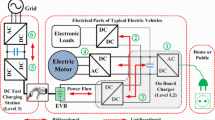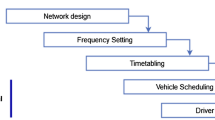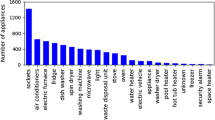Abstract
With the rapid development of battery electric buses (BEBs) in urban public traffic, it arises the problem of BEB charging scheduling, which aims to supply electric power for all the BEBs to meet the bus timetable in the smallest cost. Practical experience reports that both weather temperature and accumulative battery using time have a non-negligible impact on battery charging efficiency, and bring about the uncertainty of charging time of a battery. It may cause a negative influence to the departure schedule of the BEBs. Motivated by the above observation, this work investigates a BEB charging scheduling problem with uncertain charging time. The objective is to minimize the expected total charging cost, which consists of in-service cost, energy consumption cost and penalty cost due to over-low charging. We first prove the strong NP-hardness of the considered problem. A stochastic linear programming model is then established. A scenario-reduction based enhanced sample average approximation approach and an improved genetic algorithm are proposed to solve large-scale instances of the considered problem. Numerical experiments and comparisons with adapted previous algorithms are conducted to demonstrate the effectiveness of the proposed approaches.






Similar content being viewed by others
References
Abdelwahed A, van den Berg PL, Brandt T, Collins J, Ketter W (2020) Evaluating and optimizing opportunity fast-charging schedules in transit battery electric bus networks. Transp Sci 54(6):1601–1615
Adindu E, Sudipta C, Mohammad M, Linkan B, Burak E (2016) An enhanced sample average approximation method for stochastic optimization. Int J Prod Econ 182:230–252
Alwesabi Y, Avishan F, Yanikoglu I, Liu ZC, Wang Y (2022) Robust strategic planning of dynamic wireless charging infrastructure for electric buses. Appl Energy 307:118243
Alwesabi Y, Liu ZC, Kwon S, Wang Y (2021) A novel integration of scheduling and dynamic wireless charging planning models of battery electric buses. Energy 230:120806
Ayad A, El-Taweel NA, Farag HEZ (2021) Optimal design of battery swapping-based electrified public bus transit systems. IEEE Trans Transp Electrific 7(4):2390–2401
Chen H, Hu Z, Zhang H, Luo H (2018) Coordinated charging and discharging strategies for plug-in electric bus fast charging station with energy storage system. IET Gener Transm Distrib 12(9):2019–2028
Defersha FM, Rooyani D (2020) An efficient two-stage genetic algorithm for a flexible job-shop scheduling problem with sequence dependent attached/detached setup, machine release date and lag-time. Comput Ind Eng 147:106605
Deng RL, Liu Y, Chen WZ, Liang H (2021) A survey on electric buses-energy storage, power management, and charging scheduling. IEEE Trans Intell Transp Syst 22(1):9–22
Drezner Z, Drezner TD (2020) Biologically inspired parent selection in genetic algorithms. Ann Oper Res 287(1):161–183
Dunbar M, Belieres S, Shukla N, Amirghasemi M, Perez P, Mishra N (2020) A genetic column generation algorithm for sustainable spare part delivery: application to the Sydney DropPoint network. Ann Oper Res 290(1–2):923–941
Gao Y, Guo S, Ren J, Zhao Zh, Ehsan A, Zheng Y (2018) An electric bus power consumption model and optimization of charging scheduling concerning multi-external factors. Energies 11(8):2060
Gong X, Mi CC (2015) Temperature-dependent performance of lithium Ion batteries in electric vehicles. In: 30th annual IEEE applied power electronics conference and exposition (APEC), pp 1065–1072
He Y, Liu Z, Song Z (2020) Optimal charging scheduling and management for a fast-charging battery electric bus system. Transp Res Part E 142:102056
He Y, Song Z, Liu Z (2019) Fast-charging station deployment for battery electric bus systems considering electricity demand charges. Sustain Cities Soc 48:101530
Hossain MA, Pota HR, Squartini S, Zaman F, Guerrero JM (2019) Energy scheduling of community microgrid with battery cost using particle swarm optimisation. Applied Energy 254:113723
Hosseini M, Rahmani A, Hooshmand F (2021) A robust model for recharging station location problem. Oper Res. https://doi.org/10.1007/s12351-021-00681-y
Houbbadi A, Trigui R, Pelissier S, Redondo-Iglesias E, Bouton T (2019) Optimal scheduling to manage an electric bus fleet overnight charging. Energies 12(14):2727
Ke B, Chung Yung C, Chen Y (2016) Minimizing the costs of constructing an all plug-in electric bus transportation system: a case study in Penghu. Appl Energy 177:649–660
Ke BR, Lin YH, Chen HZ, Fang SC (2020) Battery charging and discharging scheduling with demand response for an electric bus public transportation system. Sustain Energy Technol Assess 40:100741
Kleywegt AJ, Shapiro A, Homem-de Mello T (2002) The sample average approximation method for stochastic discrete optimization. SIAM J Optim 12(2):479–502
Kong W, Melo JG, Monteiro RDC (2019) Complexity of a quadratic penalty accelerated inexact proximal point method for solving linearly constrained nonconvex composite programs. SIAM J Optim 29(4):2566–2593
Li N, Liu XY, Yu BD, Li L, Xu JQ, Tan Q (2021) Study on the environmental adaptability of lithium-ion battery powered UAV under extreme temperature conditions. Energy 219:119481
Li X, Zhang K (2018) A sample average approximation approach for supply chain network design with facility disruptions. Comput Ind Eng 126:243–251
Li XH, Wang TZ, Li LJ, Feng FY, Wang W, Cheng C (2020) Joint optimization of regular charging electric bus transit network schedule and stationary charger deployment considering partial charging policy and time-of-use electricity prices. J Adv Transp 2020:8863905
Liao TW, Ting C, Chang P (2006) An adaptive genetic clustering method for exploratory mining of feature vector and time series data. Int J Prod Res 44(14):2731–2748
Liu X, Chu F, Zheng F, Chu C, Liu M (2020) Parallel machine scheduling with stochastic release times and processing times. Int J Prod Res 59(20):6327–6346
Liu Z, Song Z, He Y (2019) Economic analysis of on-route fast charging for battery electric buses: case study in Utah. Transp Res Rec J Transp Res Board 2673(5):119–130
Luo L, Gu W, Wu Z, Zhou S (2019) Joint planning of distributed generation and electric vehicle charging stations considering real-time charging navigation. Appl Energy 242:1274–1284
Ma XL, Miao R, Wu XK, Liu XL (2021) Examining influential factors on the energy consumption of electric and diesel buses: a data-driven analysis of large-scale public transit network in Beijing. Energy 216:119196
Montoya A, Gueret C, Mendoza JE, Villegas JG (2017) The electric vehicle routing problem with nonlinear charging function. Transp Res Part B 103:87–110
Motoaki Y, Yi WQ, Salisbury S (2018) Empirical analysis of electric vehicle fast charging under cold temperatures. Energy Policy 122:162–168
Park BJ, Choi HR, Kim HS (2003) A hybrid genetic algorithm for the job shop scheduling problems. Comput Ind Eng 45(4):597–613
Paul T, Yamada H (2014) Operation and charging scheduling of electric buses in a city bus route network. In: IEEE 17th international conference on intelligent transportation systems (ITSC)
Pelletier S, Jabali O, Laporte G, Veneroni M (2017) Battery degradation and behaviour for electric vehicles: review and numerical analyses of several models. Transp Res Part B 103:158–187
Pinedo M, Hadavi K (1992) Scheduling: theory, algorithms and systems. Springer, Berlin
Ritchie P, Clarke JJ, Cox PM, Huntingford C (2021) Large-scale origami locks into place under pressure. Nature 592(7855):517–523
Rogge M, Wollny S, Sauer D (2015) Fast charging battery buses for the electrification of urban public transport a feasibility study focusing on charging infrastructure and energy storage requirements. Energies 8(5):4587–4606
Schneider F, Thonemann UW, Klabjan D (2018) Optimization of battery charging and purchasing at electric vehicle battery swap stations. Transp Sci 52(5):1211–1234
Selim SZ, Ismail MA (1984) K-means-type algorithms: a generalized convergence theorem and characterization of local optimality. IEEE Trans Pattern Anal Mach Intell 6(1):81–87
Sweda TM, Dolinakaya IS, Klabjan D (2016) Optimal recharging policies for electric vehicles. Transp Sci 51(2):457–479
Tang X, Lin X, He F (2019) Robust scheduling strategies of electric buses under stochastic traffic conditions. Transp Res Part C 105:163–182
Uhrig M, Weiß L, Suriyah M, Leibfried T (2015) E-mobility in car parks—guidelines for charging infrastructure expansion planning and operation based on stochastic simulations. In: The 28th international electric vehicle symposium and exhibition, KINTEX, Korea, Goyang, Korea
Wang Y, Huang Y, Xu J, Barclay N (2017) Optimal recharging scheduling for urban electric buses: a case study in Davis. Transp Res Part E 100:115–132
Wei Z, Li Y, Zhang Y, Cai L (2018) Intelligent parking garage EV charging scheduling considering battery charging characteristic. IEEE Trans Ind Electron 65(3):2806–2816
Xia Y, Chen B, Yue J (2005) Sequence jobs and assign due dates with uncertain processing times and quadratic penalty functions. In: International conference on algorithmic applications in management (AAIM), pp 261–269
Xu M, Meng Q (2019) Fleet sizing for one-way electric carsharing services considering dynamic vehicle relocation and nonlinear charging profile. Transp Res Part B 128:23–49
Xu Z, Dang Y (2020) Automated digital cause-and-effect diagrams to assist causal analysis in problem-solving: a data-driven approach. Int J Prod Res 58(17):5359–5379
Xylia M, Leduc S, Patrizio P, Kraxner F, Silveira S (2017) Locating charging infrastructure for electric buses in Stockholm. Transp Res Part C 78:183–200
You PC, Yang ZY, Zhang YM, Low SH, Sun YX (2016) Optimal charging schedule for a battery switching station serving electric buses. IEEE Trans Power Syst 31(5):3473–3483
Zhang L, Wang S, Qu X (2021) Optimal electric bus fleet scheduling considering battery degradation and non-linear charging profile. Transp Res Part E 154:102445
Zhuang Q, Xu SD, Qiu XY, Cui YL, Fang LA, Sun SG (2010) Diagnosis of electrochemical impedance spectroscopy in lithium ion batteries. Prog Chem 78:183–200
Funding
Funding was provided by National Natural Science Foundation of China (Grant Number 71771048, 71832001, 72021002 and 72071144.
Author information
Authors and Affiliations
Corresponding author
Ethics declarations
Conflict of interest
The authors declare that they have no known competing financial interests or personal relationships that could have appeared to influence the work reported in this paper.
Additional information
Publisher's Note
Springer Nature remains neutral with regard to jurisdictional claims in published maps and institutional affiliations.
Appendix A Calculation of the optimal charging level \(H^*_{j}(\omega )\) of one BEB
Appendix A Calculation of the optimal charging level \(H^*_{j}(\omega )\) of one BEB
In this work, the theoretical optimal charging level of BEB \(j \in {\mathcal {N}}\) can be calculated in the following two cases. Denote by \({\mathcal {C}}_j(\omega )\) the total charging cost contributed by BEB j in event \(\omega\).
Case 1: \(a_j\ge 80\).
\(t_{jw}(\omega ) = 2\cdot \rho _j(\omega )\cdot w\) (\(j\in {{\mathcal {N}}}\) and \(\omega \in \Omega\)), and then \({\mathcal {C}}_j(\omega )\) can be formulated as below.
Case 2: \(a_j< 80\).
In this case, we formulate \({\mathcal {C}}_j(\omega )\) (\(j\in {{\mathcal {N}}}\) and \(\omega \in \Omega\)) in two sub-cases where \(l_j\ge 80\) and where \(l_j< 80\).
Case 2.1: \(l_j\ge 80\).
As \(H_j(\omega )+a_j(\omega )\ge 80\) in this case, we know that
Case 2.2: \(l_j< 80\). In this case, the expression of formula \({\mathcal {C}}_j(\omega )\) depends on the value of \(H_j(\omega )\). Specifically, we reformulate \({\mathcal {C}}_j(\omega )\) according to the value of \(H_j(\omega )\) as below.
Observation A.1
In any case, we can find the theoretical optimal charging level of BEB \(j \in {\mathcal {N}}\) within interval \([\max \{l_j-a_j,0\},\min \{ub-a_j, \tau _{d_j-r_j}(\omega )\}]\) by calling the univariate quadratic function solver. Note that \(\tau _{d_j-r_j}(\omega )\) denotes the maximum charging level that BEB j can achieve in the time period, i.e., time \(r_j\) to time \(d_j-r_j-(t^{in}+t^{off})-2\cdot \min \limits _{i\in {\mathcal {M}}}\{\frac{dis_{ij}}{v}\}\)). Besides, no matter what solver is used, the obtained numerical result needs to be rounded because the charging level is set to be a positive integer.
Rights and permissions
Springer Nature or its licensor holds exclusive rights to this article under a publishing agreement with the author(s) or other rightsholder(s); author self-archiving of the accepted manuscript version of this article is solely governed by the terms of such publishing agreement and applicable law.
About this article
Cite this article
Zheng, F., Wang, Z. & Liu, M. Overnight charging scheduling of battery electric buses with uncertain charging time. Oper Res Int J 22, 4865–4903 (2022). https://doi.org/10.1007/s12351-022-00740-y
Received:
Revised:
Accepted:
Published:
Issue Date:
DOI: https://doi.org/10.1007/s12351-022-00740-y




